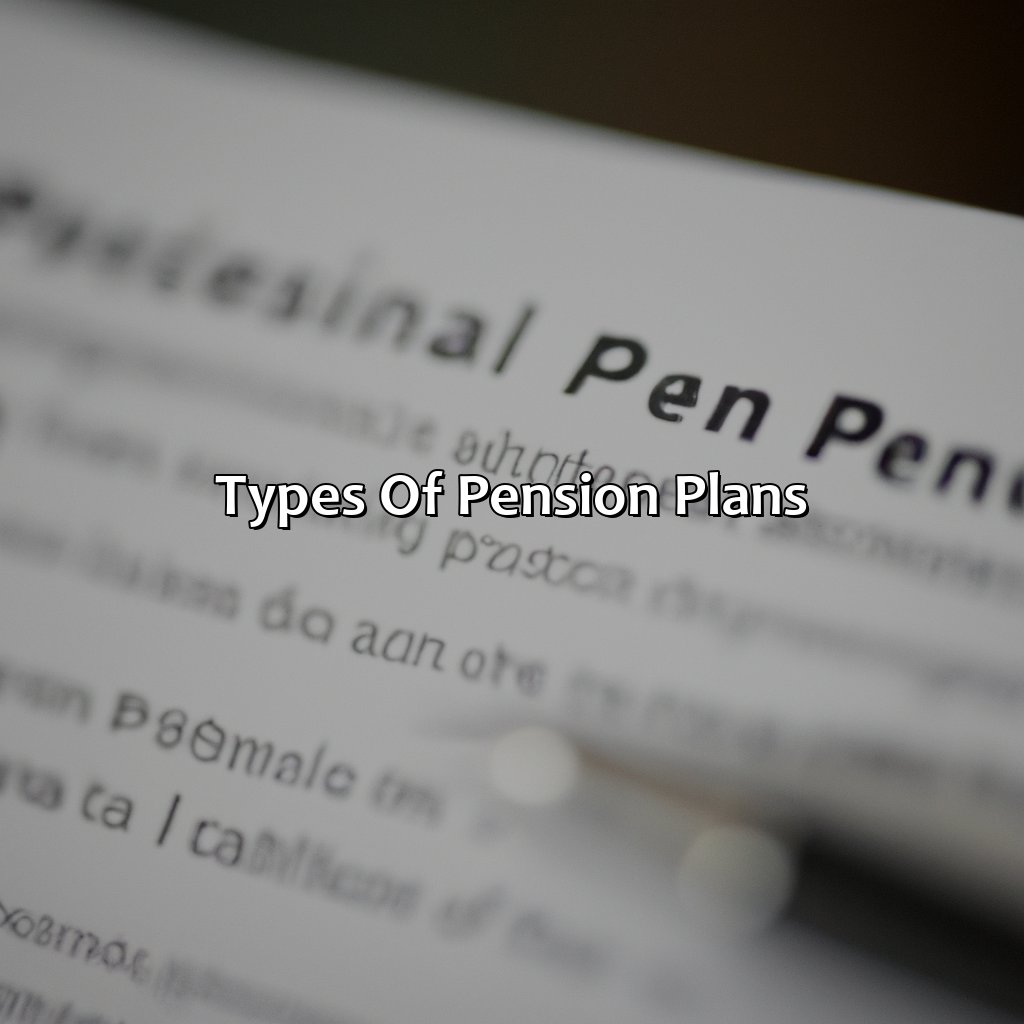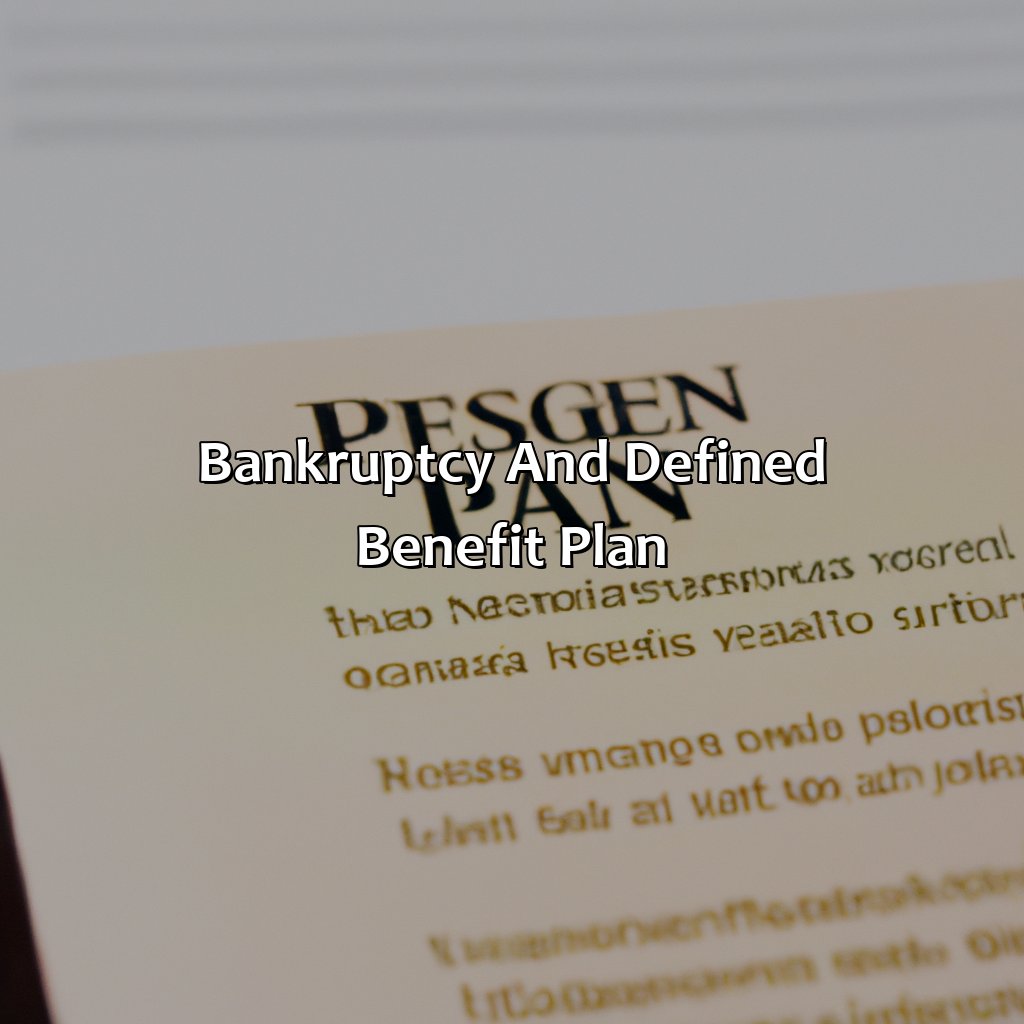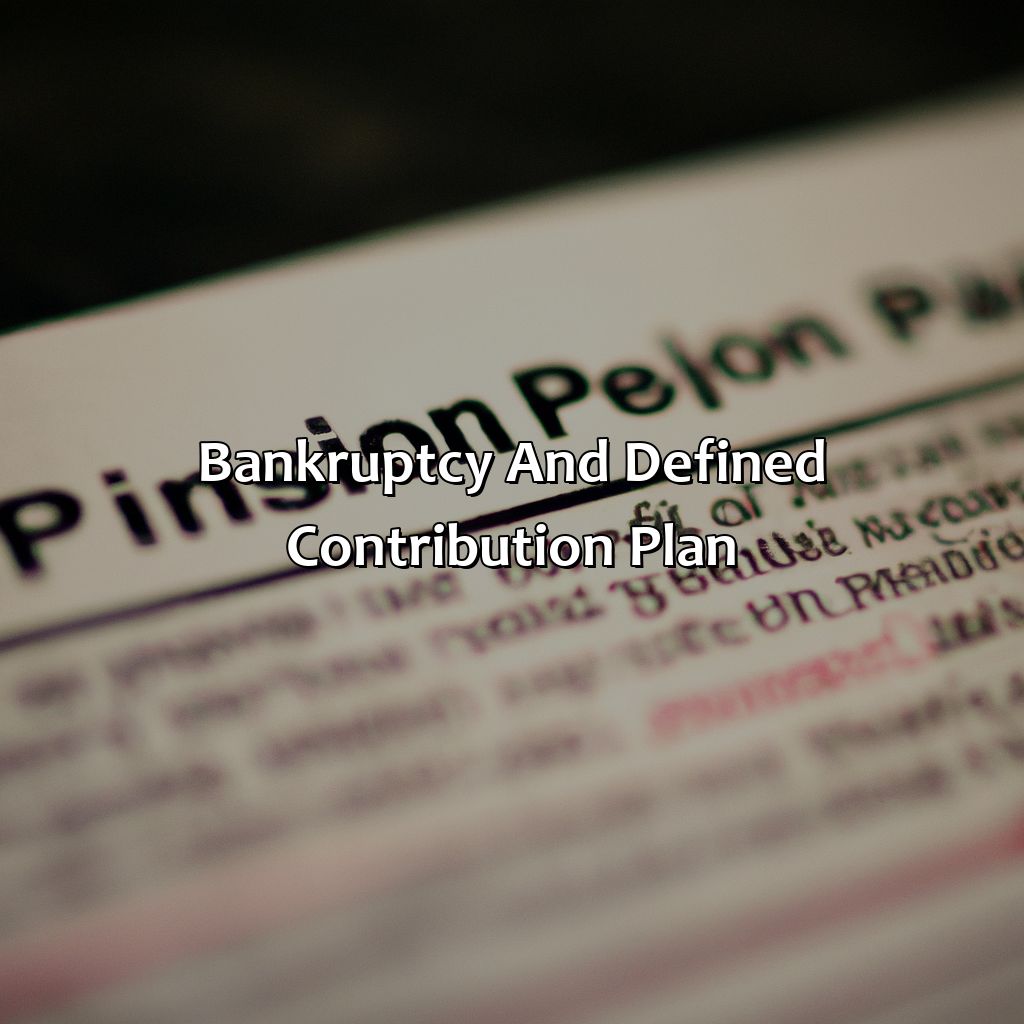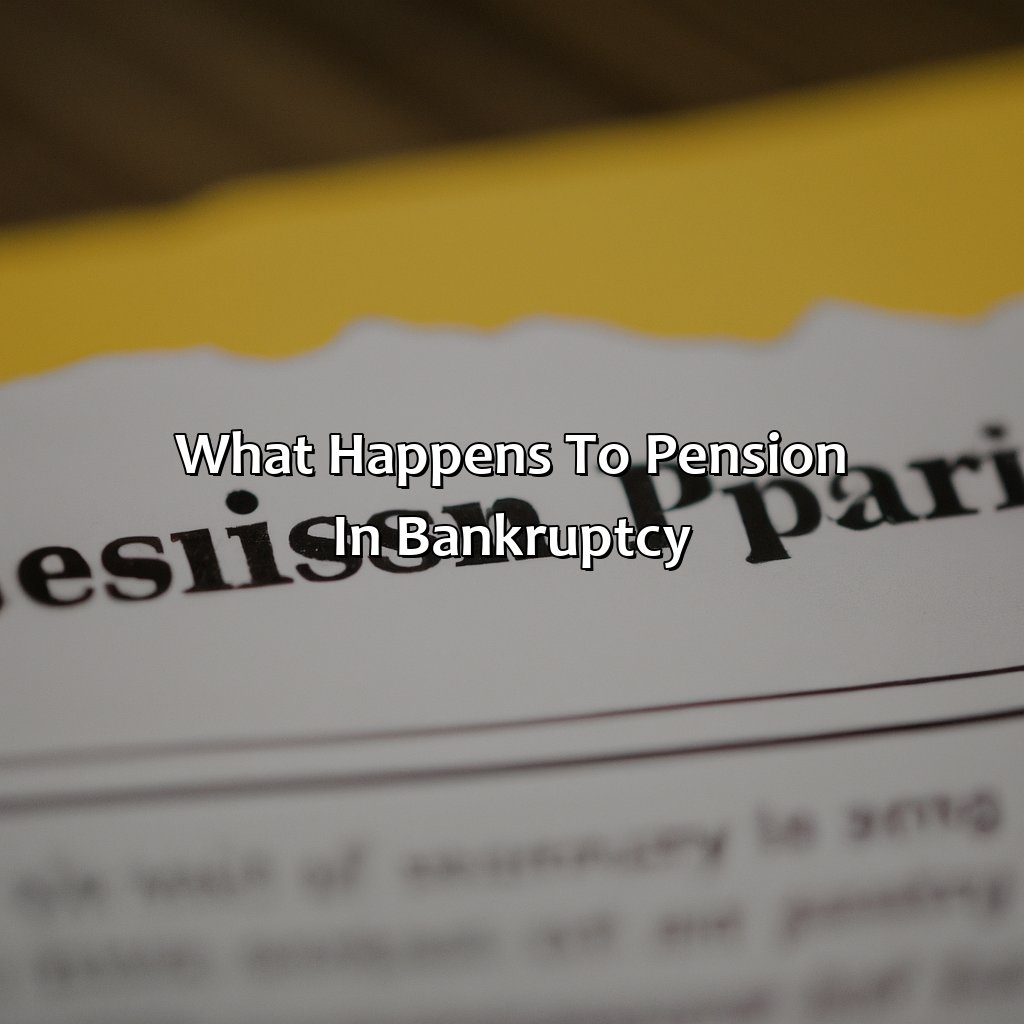What Happens To Pension In Bankruptcy?
Key Takeaway:
- Defined Benefit Plans may be protected in bankruptcy due to the Pension Benefit Guaranty Corporation (PBGC).
- Defined Contribution Plans, such as a 401(k) or Individual Retirement Account (IRA), are generally safe in bankruptcy and are considered exempt assets up to a certain amount.
- It is important to consult with a financial advisor and carefully review the terms of your pension plan and bankruptcy laws to fully understand the impact of bankruptcy on your pension.
Are you worried about how bankruptcy affects your pension? Read on to learn what happens to pension funds when someone files for bankruptcy. You’ll gain valuable insight into how to protect your retirement funds.
Types of Pension Plans
Types of Pension Plans:
When it comes to planning for retirement, choosing the right pension plan is crucial. Different types of pension plans offer varying features and benefits that can impact your retirement savings. Here are some common types of pension plans:
| Plan Type | Description |
|---|---|
| Defined Benefit Plan | Employer promises a specific retirement benefit based on a formula usually considering length of service and salary history. |
| Defined Contribution Plan | Employer and/or employee contribute a fixed amount to the employee’s individual account, with investment returns determining the final benefit. |
| Cash Balance Plan | Hybrid of defined benefit and defined contribution plans, employer promises a specified benefit that’s calculated as a hypothetical account balance instead of a traditional pension benefit rating, with guaranteed minimum interest to accrue over time. |
| State and Local Government Pension Plans | Funded by government employers with a defined benefit plan that typically requires employees to contribute a portion of their salaries. |
It’s important to distinguish between pension plan types to maximize your retirement savings.
Knowing about the different pension plans is important if you want to plan your retirement well. For instance, if you are a teacher, you should know what the normal pension age for teachers is.
While you should consider your options carefully, don’t miss out on the benefits of a good pension plan. Consult with a financial advisor or HR professional to make informed decisions and take advantage of retirement saving opportunities now. Make sure to stay on top of your pension plan and don’t let a misunderstanding or lack of attention lead to lost savings. Start planning for your future today.

Image credits: retiregenz.com by David Washington
Bankruptcy and Defined Benefit Plan
In the event of a company going bankrupt, individuals enrolled in a defined benefit plan may be concerned about their pensions. The question on many people’s minds is, what happens to pension in bankruptcy? Unfortunately, the answer is not straightforward and may vary depending on different factors such as the type of plan and the bankruptcy process.
Generally, defined benefit pension plans are protected by the federal Employee Retirement Income Security Act (ERISA) in the event of bankruptcy. However, there are some exceptions to this rule. For instance, if the plan is underfunded, there may be limitations on how much the Pension Benefit Guaranty Corporation (PBGC) would pay out. In addition, it is important to note that beneficiaries of teacher pensions, which are a type of defined benefit plan, are typically not affected by a company’s bankruptcy.
It is essential to understand that the process of bankruptcy can be complicated, and the protection of pensions may not always be guaranteed. The extent of protection depends on various factors such as the type of plan and the amount of funding in the plan. It is advisable to consult a legal professional for guidance on what is pension debt and how best to proceed.
According to a report by the Pension Rights Center, approximately 1,500 multiemployer pension plans are at risk of becoming insolvent in the near future, which would affect millions of people in the United States. If you are a teacher and want to know how to opt out of teachers pension, you can find more information on retiregenz.com.

Image credits: retiregenz.com by Joel Washington
Bankruptcy and Defined Contribution Plan
Bankruptcy and Defined Contribution Plan: When faced with bankruptcy, a defined contribution plan provides specific protections and rules to safeguard the funds contributed by the employee and the employer.
In such cases, the funds set aside in the plan are referred to as “protected benefits”. However, in certain instances, such as a plan participant not being fully vested, the unprotected portion could be at risk. The decision on how to distribute funds is subject to the rules of the Employee Retirement Income Security Act and the Internal Revenue Service. If you want to know more about how a pension is paid out, visit our website now.
It’s important to note that certain types of defined contribution plans may have distinct requirements or exceptions in place in a bankruptcy situation. For instance, 401(k) plans and individual retirement accounts have specific protections under federal law for a debtor filing a bankruptcy claim. If you’re a teacher, you may want to know how much of your pension your spouse will receive when you die.
Pro Tip: It’s a good practice to maintain accurate records of your contributions and to notify your trustee if you have any additional retirement accounts outside of the plan. This can make the distribution process smoother and help ensure that you receive the maximum amount of protected benefits.

Image credits: retiregenz.com by Harry Jones
Some Facts About What Happens to Pension in Bankruptcy:
- ✅ In general, pensions are protected in bankruptcy proceedings and cannot be seized by creditors. (Source: The Balance)
- ✅ The type of pension plan and the state in which the bankruptcy is filed can impact the level of protection provided. (Source: Investopedia)
- ✅ In some cases, a debtor may be required to use some portion of their pension funds to repay creditors. (Source: LegalZoom)
- ✅ The Pension Benefit Guaranty Corporation (PBGC) provides protection to certain types of employer-sponsored pension plans in the event of bankruptcy. (Source: PBGC)
- ✅ It is important to consult with a bankruptcy attorney to understand the specific laws and regulations governing pensions in bankruptcy. (Source: Nolo)
FAQs about What Happens To Pension In Bankruptcy?
What happens to pension in bankruptcy?
In general, pension plans are protected in bankruptcy and are exempt from being used to pay off a debtor’s creditors. However, the specific rules regarding pension protection can vary depending on the type of bankruptcy and the specific circumstances of the case.
Can my pension be completely exempt from bankruptcy?
In some cases, a pension may be considered exempt from bankruptcy, meaning that it cannot be used to pay off the debts of the debtor. This exemption can depend on a variety of factors, including the type of pension plan, the state in which the debtor resides, and the specific bankruptcy laws that apply.
What happens if I have a 401(k) or other retirement plan?
Most 401(k) plans and other retirement plans are also protected in bankruptcy and cannot be used to pay off the debts of the debtor. However, there may be some limitations on the amount that can be exempted, and it is important to consult with a bankruptcy attorney to understand your specific rights and protections.
Can a bankruptcy court ever touch my pension?
In rare cases, a bankruptcy court may be able to touch a debtor’s pension if the plan is not fully funded or if there are other extenuating circumstances. However, these situations are rare and typically do not occur unless the debtor has engaged in illegal or fraudulent activities related to the pension.
What should I do if I am concerned about my pension in bankruptcy?
If you are concerned about the protection of your pension in bankruptcy, it is important to consult with a qualified bankruptcy attorney who can help you understand your rights and options. Your attorney can also work with you to develop a plan to protect your pension in the event of bankruptcy.
Can I still receive my pension payments during bankruptcy proceedings?
Generally, you should still be able to receive your pension payments during bankruptcy proceedings. However, it is important to consult with a qualified bankruptcy attorney to understand your specific rights and protections.
